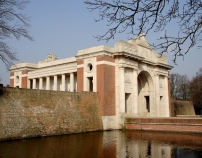| First Name: | Ralph | Last Name: | CARLTON | |
|---|---|---|---|---|
| Date of Death: | 23/10/1914 | Lived/Born In: | London | |
| Rank: | Private | Unit: | Yorkshire2 | |
| Memorial Site: | Menin Gate, Ypres | |||
Current Information:Born-Manchester Enlisted-Stratford
First Battle of Ypres Between 21st October and 22nd November, 1914 a desperate fight took place around the Belgium city of Ypres, the first of three major battles that were to be fought there during the course of the war. British troops entered Ypres in October. The 1st and 2nd Divisions plus the 3rd Cavalry Division had made their way up from the Aisne as part of the “Race to the Sea”, whilst the 7th Division came west to Ypres after Antwerp had fallen. The Germans knew that Ypres was the gateway to the Channel ports and that these were vital to Britain’s war effort so they poured reinforcements into the area. The fighting fell into three distinct battles; the Battle of Langemarck, 21-24 October, the Battle of Gheluvelt, 29-31 October and the Battle of Nonne Bosschen, 11 November. Ypres did not fall to the Germans but its defence during these two months resulted in the destruction of much of the old regular British Army. At 7 am on 22nd October, there was a heavy bombardment on IV Corps, particularly near the junction of 21 and 22 Brigades of 7th Division in front of Polygon Wood in the Ypres salient. This was followed in the afternoon by an infantry attack when the Germans advanced in platoon columns of fours over the crest of the ridge running from Becelaere to Zonnebeke. The brunt of the attack fell on 21 Brigade where the 2nd Yorkshire, 2nd Royal Scots Fusiliers and 2nd Wiltshire battalions were in the line with 1st South Staffordshire, 22 Brigade on the left. The young German soldiers were shot down en masse. The dead and wounded were everywhere. Some got to within 200 yards of 2nd Wiltshire and some even penetrated the gap between 2nd Yorkshire and 2nd Royal Scots Fusiliers only to be dealt with by the reserve companies. The Germans fell back, rallied and then attacked again the flanks of 2nd Wiltshire but were again repulsed by shrapnel and rifle fire. At this stage the Germans dug in. At dusk one company of 2nd Yorkshire and one of 2nd Royal Scots Fusiliers attempted to recover the trenches near Poezelhoek lost the previous day but were unable to do so. The battalion remained in these trenches until relieved on 27th October, under continuous heavy shell fire and with the casualties mounting daily. One of these was Ralph Carlton who was killed on 23rd October when, as well as the shell fire, there was a heavy attack on the centre of the battalion’s line. |
||||
| « Back to Search Results | ||||
| If you think any of the information shown here is incorrect, Click Here to submit your amends and comments | ||||




